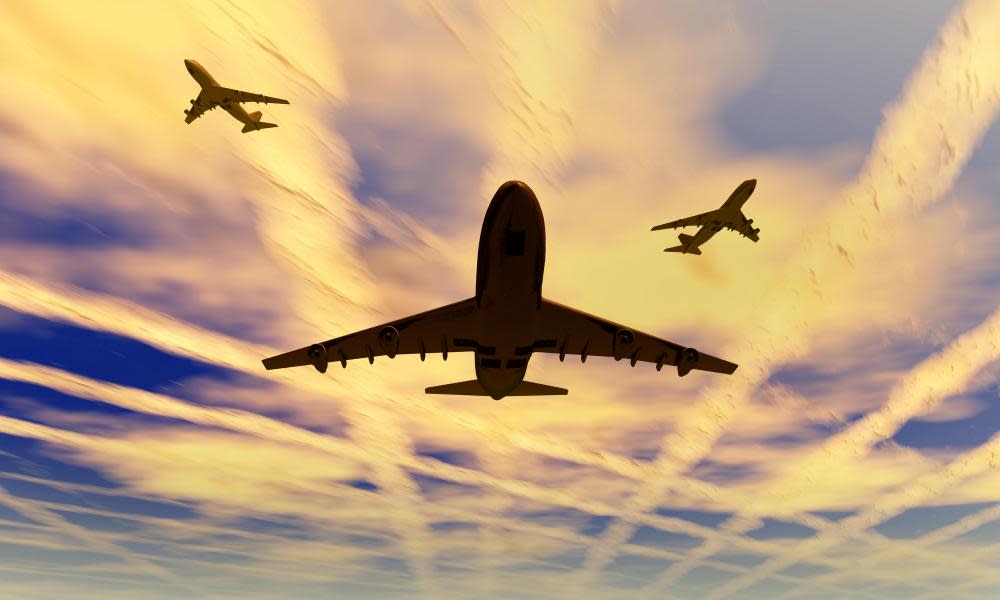Aviation chiefs rejected measures to curb climate impact of jet vapours

Airlines and airports opposed measures to combat global warming caused by jet vapour trails that evidence suggests account for more than half of the aviation industry’s climate impact, new documents reveal.
The industry argued in government submissions that the science was not “robust” enough to justify reduction targets for these non-CO2 emissions. Scientists say the climate impact of vapour trails, or contrails, has been known for more than two decades, with one accusing the industry of a “typical climate denialist strategy”.
While carbon emissions from jet engines contribute to global heating, research suggests the contrails formed when water vapour and soot particles form into ice crystals have an even greater impact. These human-made clouds trap heat in the atmosphere that would otherwise escape into space.
Lobbying on vapour trails in documents obtained by openDemocracy highlights the lack of a consensus among airline executives, scientists and carbon offsetting websites over the exact climate impact of flying. It means people who wish to offset the environmental impact of their flights get significantly different prices.
The Intergovernmental Panel on Climate Change estimated in a special report in 1999 that the historic impact of aviation on the climate was two to four times greater than from its CO2 emissions alone. A 2020 study by the EU also reported that non-CO2 aircraft emissions, comprised mainly of contrails, warm the planet about twice as much as the carbon dioxide released by planes, but acknowledged there were “significant uncertainties”.

Photograph: Rob Matthews/Alamy
Piers Forster, professor of climate physics at Leeds University and a member of the Climate Change Committee, which advises the government on emissions targets, said: “The industry should not hide behind uncertainty and needs to act to rapidly reduce both its CO2 and non-CO2 effects.”
Milan Klöwer, a climate scientist at Massachusetts Institute of Technology, said airlines were adopting a “typical climate denialist strategy” by overstating the level of uncertainty about non-CO2 effects. He said: “Even in the best case, they roughly double the effect of CO2 emissions on the climate.”
The aviation industry said in submissions to the government’s 2021 consultation for its “jet zero” strategy of achieving net-zero carbon emissions that more research was required on the impact of non-CO2 impacts.
Airlines UK, the trade body for UK-registered airlines, said: “The science around [non-CO2 impacts] is not yet robust enough to form reduction targets.” Ryanair and Wizz Air said it was too early to formulate and implement policies to mitigate the impact of contrails.
Sustainable Aviation, which brings together airlines, airports and other industry players, said there were projects examining ways to reduce non-CO2 emissions, but it was too early for regulation.
It said: “Given the complexity of non-CO2 impacts, developing science and a wide range of impacts, we do not believe that non-CO2 emissions should be included in consumer-facing information.”
Unveiling the jet zero strategy last year, the government said sustainable aviation fuel was expected to mitigate the climate impact of contrails.
Airlines tend to ignore non-CO2 effects in the schemes to offset flight emissions. The official tool of the International Civil Aviation Organisation to calculate emissions also does not include contrails in its methodology.
BA’s emissions calculator says that a one-way flight from London Heathrow to New York emits 348kg CO2E (carbon dioxide equivalent) and charges £3.97 for offsetting.
But Atmosfair, a German non-profit organisation that supports the decarbonisation of flying, calculates that the same journey in a Boeing 777-200, an aircraft type used by BA, emits 896kg and charges £18.37 for offsetting. Atmosfair’s emissions include equivalent CO2 emissions of 587kg, which is largely for contrails.
A spokesperson for Sustainable Aviation said: “UK aviation recognises that non-CO2 impacts need to be better understood and tackled, and supports further research. This is why we welcomed the inclusion of non-CO2 monitoring solutions in the EU Emissions Trading Scheme [and] why trials of aircraft powered by sustainable aviation fuels will include monitoring of non-CO2 benefits.”
Rob Bryher, aviation campaigner at climate charity Possible, said: “These documents show that airlines cannot be trusted to decarbonise on their own. Demand management solutions like a frequent flyer levy, introducing fuel duty, carbon pricing, or management of airport capacity are going to be crucial.”
The Department for Transport said: “Our jet zero strategy confirmed our aim of addressing the non-CO2 impacts of aviation, by developing our understanding of their impact and possible solutions, and the UK is one of the leading countries working to address this issue.”


